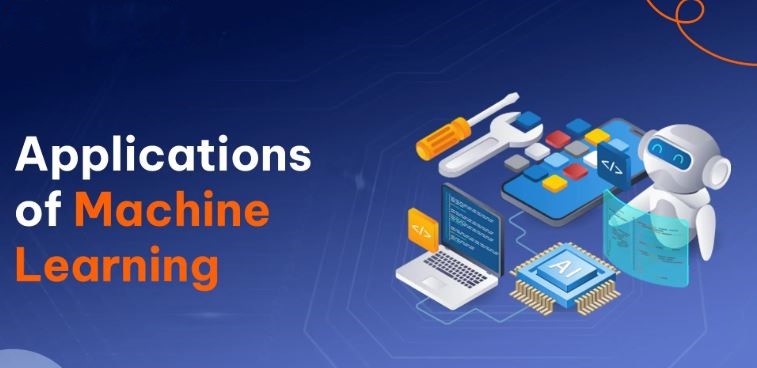Machine learning (ML) has become one of the most impactful technologies in today’s digital era. From recommending your favorite Netflix shows to detecting fraudulent transactions, ML applications are shaping the way we live, work, and interact with technology. Businesses, governments, and research institutions rely on machine learning to automate processes, make better decisions, and uncover insights hidden in massive datasets.
In this article, we will explore in detail what the applications of machine learning are across different industries, how they work, and why they matter. By the end, you will have a clear understanding of the practical role ML plays in transforming everyday life and business operations.
What Is Machine Learning?
Before diving into the applications, it is essential to understand the basics.
Machine learning is a subset of artificial intelligence (AI) that enables systems to learn from data, identify patterns, and make decisions with minimal human intervention. Unlike traditional programming, where explicit rules are defined, ML algorithms improve their performance as they are exposed to more data.
Types of Machine Learning
- Supervised Learning – Algorithms learn from labeled data (e.g., spam detection in emails).
- Unsupervised Learning – Algorithms analyze unlabeled data to find hidden structures (e.g., customer segmentation).
- Reinforcement Learning – Algorithms learn by interacting with an environment and receiving feedback (e.g., training robots to perform tasks).
Applications of Machine Learning in Different Industries
Healthcare
Machine learning has revolutionized healthcare by improving diagnostics, treatment, and patient care.
Medical Imaging and Diagnostics
ML algorithms analyze X-rays, MRIs, and CT scans to detect diseases like cancer, tumors, and fractures more accurately than traditional methods.
Predictive Analytics in Patient Care
Hospitals use ML models to predict patient readmissions, detect potential complications, and recommend personalized treatment plans.
Drug Discovery
ML accelerates drug research by predicting how certain compounds will interact with biological systems, reducing the time and cost of developing new medicines.
Finance
The financial sector is one of the biggest adopters of machine learning.
Fraud Detection
ML models analyze millions of transactions in real time to detect unusual behavior, helping banks stop fraudulent activities.
Algorithmic Trading
Financial institutions use ML to build trading bots that predict market movements and execute trades at optimal times.
Credit Scoring and Risk Assessment
Banks use ML algorithms to assess creditworthiness by analyzing spending habits, transaction history, and financial behavior.
Retail and E-Commerce
E-commerce giants rely heavily on ML to improve customer experiences and boost sales.
Recommendation Systems
Platforms like Amazon and Netflix use ML-based recommendation engines to suggest products or content tailored to individual preferences.
Customer Segmentation
ML analyzes customer data to group users into segments, enabling businesses to create targeted marketing campaigns.
Inventory Management
Retailers use ML to forecast demand and optimize stock levels, reducing waste and ensuring availability.
Transportation and Logistics
ML plays a vital role in optimizing transportation systems and supply chain management.
Autonomous Vehicles
Self-driving cars use ML algorithms to process data from sensors and cameras, enabling them to navigate safely.
Route Optimization
Logistics companies use ML to find the most efficient delivery routes, reducing fuel costs and delivery times.
Predictive Maintenance
Airlines and shipping companies use ML models to predict equipment failures before they occur, ensuring smoother operations.
Cybersecurity
As cyber threats become more sophisticated, ML helps organizations strengthen their defense systems.
Threat Detection
ML identifies unusual patterns in network traffic and flags potential cyberattacks.
Spam and Phishing Detection
Email providers use ML to filter spam and phishing attempts, keeping users safe from scams.
Behavior Analysis
ML tracks user activity to detect compromised accounts or insider threats.

Education
Education is another sector where ML applications are growing rapidly.
Personalized Learning
ML-driven platforms analyze student performance and adapt learning materials to suit individual needs.
Predictive Analytics in Student Success
Universities use ML to predict dropout risks and provide timely interventions.
Automated Grading
ML automates grading of assignments and exams, saving time for teachers.
Manufacturing
The manufacturing industry benefits from ML in optimizing production and ensuring quality.
Quality Control
ML models analyze product images to detect defects during manufacturing.
Supply Chain Optimization
Manufacturers use ML to predict demand, manage suppliers, and optimize logistics.
Predictive Maintenance
ML monitors equipment conditions to predict failures, minimizing downtime.
Agriculture
Agriculture is being transformed through precision farming powered by ML.
Crop Yield Prediction
ML analyzes soil conditions, weather patterns, and crop health to predict harvest yields.
Pest Detection
Farmers use ML-powered drones and sensors to detect pests and diseases early.
Smart Irrigation
ML systems optimize water usage by predicting irrigation needs based on environmental data.
Entertainment and Media
Machine learning enhances user experience in entertainment and digital media.
Content Recommendation
Platforms like Spotify, YouTube, and Netflix personalize playlists and video suggestions using ML.
Sentiment Analysis
Media companies use ML to analyze audience reactions to movies, series, and campaigns.
Deepfake Detection
ML helps in identifying manipulated content and protecting against misinformation.
Energy Sector
Energy companies rely on ML for efficiency and sustainability.
Smart Grids
ML models predict energy demand, ensuring better distribution of resources.
Renewable Energy Forecasting
ML helps forecast wind and solar power generation, improving grid stability.
Equipment Monitoring
Energy companies use ML for predictive maintenance of turbines and pipelines.
Government and Security
Governments use ML to improve public services and security.
Crime Prediction
Law enforcement agencies use ML to analyze crime patterns and predict potential hotspots.
Surveillance Systems
ML-powered cameras help detect suspicious activities in real time.
Disaster Management
Governments use ML to forecast natural disasters like floods and earthquakes for better preparedness.
Challenges of Applying Machine Learning
While ML has vast applications, it faces challenges:
- Data Privacy Concerns – Sensitive data must be handled securely.
- Bias in Algorithms – If data is biased, results will be unfair.
- High Costs – Developing and training ML models can be expensive.
- Skill Gap – There is a shortage of professionals with ML expertise.

Future of Machine Learning Applications
The future of ML is promising, with innovations like explainable AI (XAI), edge computing, and integration with blockchain expected to enhance its applications. Industries will rely more on ML to automate complex processes, improve decision-making, and drive growth.
Conclusion
So, what are the applications of machine learning? As we’ve seen, ML is not confined to one industry—it is everywhere: from diagnosing diseases and preventing fraud to personalizing shopping experiences and enabling self-driving cars. Its applications continue to expand as technology evolves, making ML a cornerstone of innovation in the 21st century.
Machine learning is no longer just a research concept—it is a real-world solution shaping the future of how we live and work.





